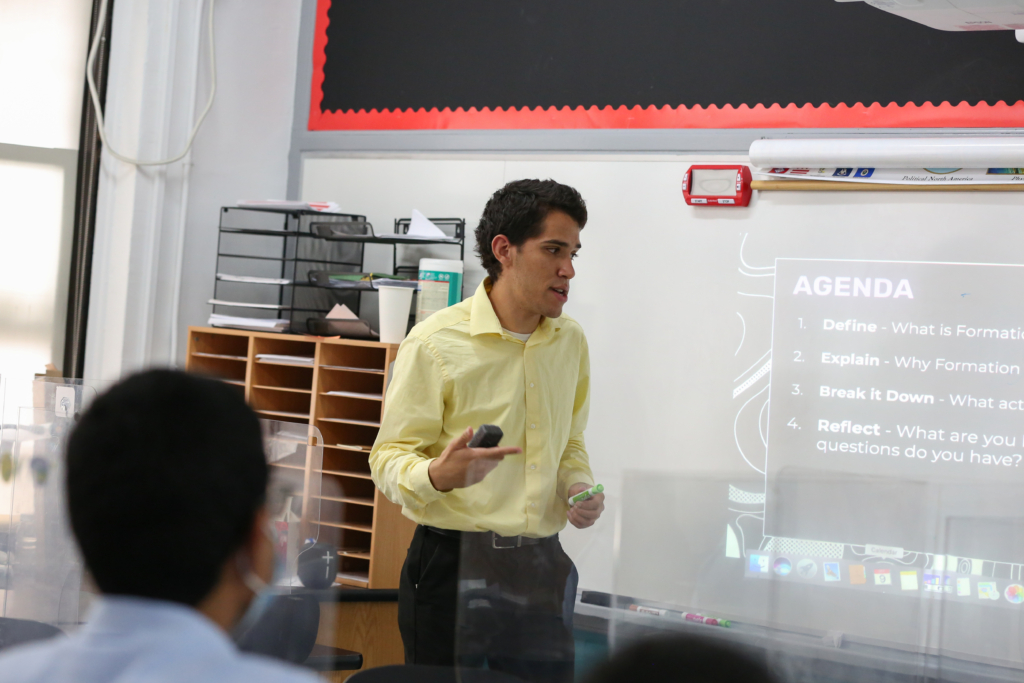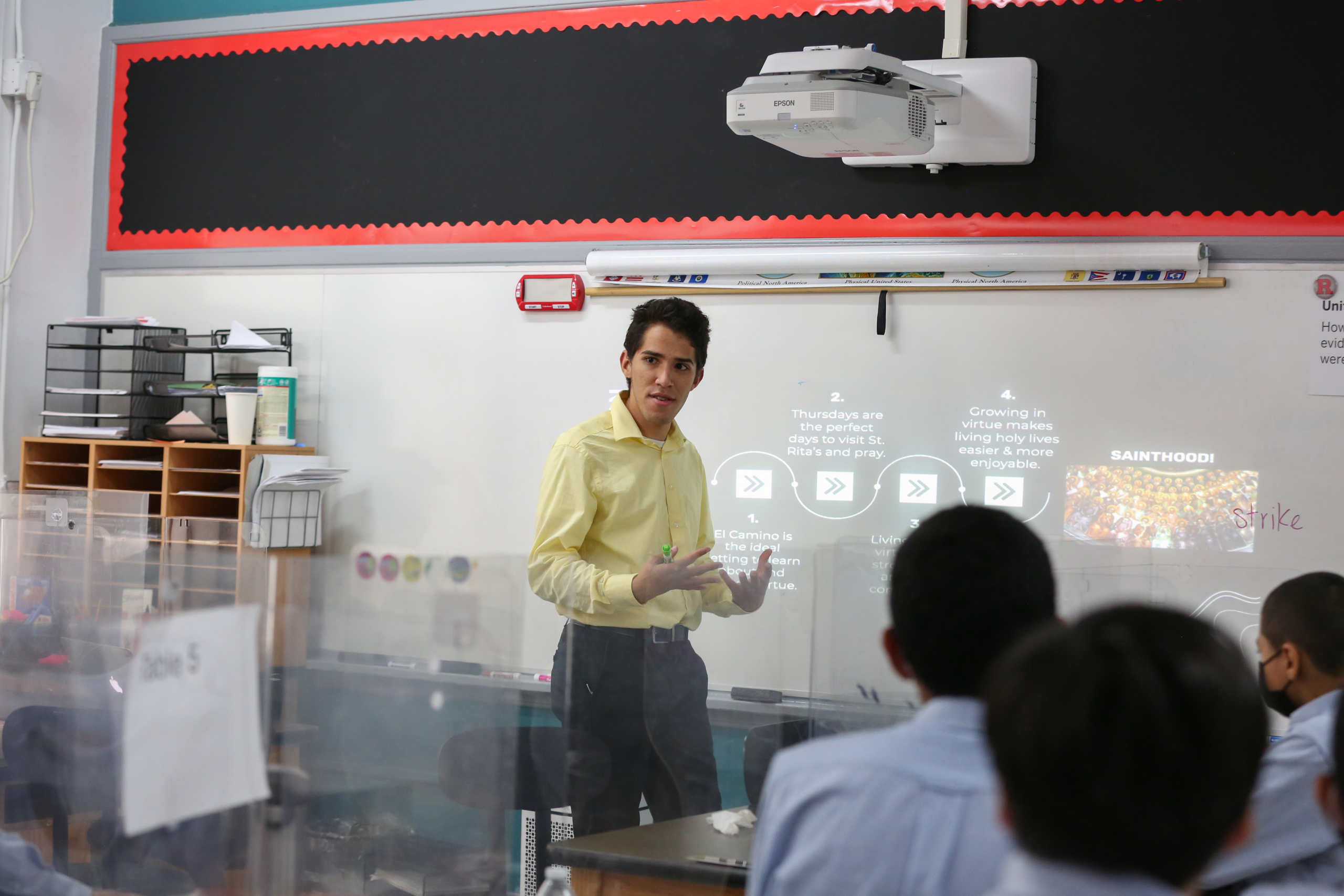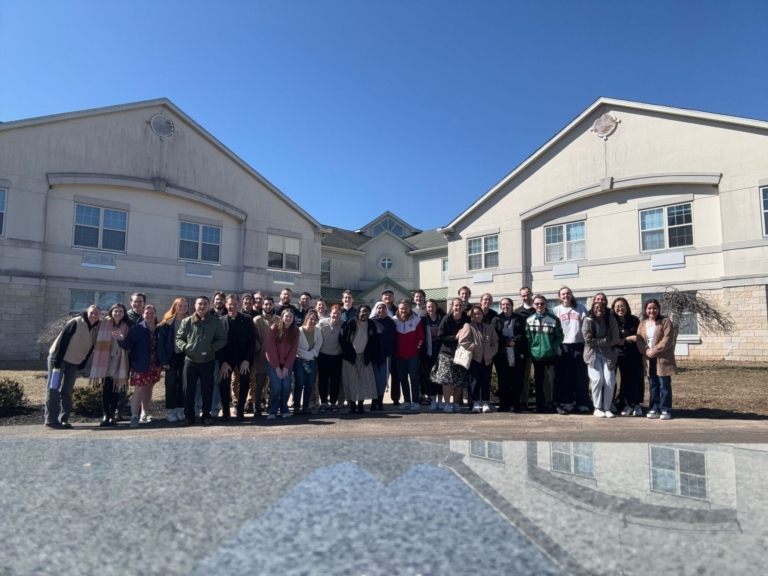Thomas May is a Cohort 8 Seton Teaching Fellow serving at Brilla College Prep Middle School in the Bronx, New York. He attended Thomas Aquinas College where he studied the classical liberal arts. In this short piece, read Thomas’s reflection on teaching, his thoughts on awakening the gifts of students through education, and his experience of learning how to be Christlike in the classroom.
I attended a teachers’ seminar on Book 7 of The Republic, and was struck by a profound question the text brings up. Socrates mentions that there is a sort of forcing that happens in order to free men from the cave. In case you are not familiar with the analogy, the cave represents knowledge of surface level truths and so ignorance of anything beyond the basic human knowledge. The men who live in the cave think that their world is complete, and don’t realize that there is a land of sunlight and beauty beyond their own dark reality. They are literally imprisoned in their own world, and cannot escape.
Socrates says that they must be dragged into the world of sunlight, and that their freedom from the cave requires a kind of violence in forcing them to leave the cave and look at a land of light, which will hurt their eyes. He suggests that they will struggle against this world because it is too bright for them and their eyes are not adjusted. If this is a metaphor for teaching, one would interpret this as students who encounter difficult concepts, and almost despair of ever understanding them.
Later on, however, Socrates says very explicitly that students cannot be forced to learn, that they will necessarily reject what is forced upon them, and so they must choose the education themselves. Incidentally, he suggests education should be made to be fun, so that the students will choose to engage with it.
I don’t claim to have fully considered this apparently inherent contradiction between forcing a student to learn, as opposed to letting the student choose themselves. It is possible that a closer reading would bring out better context for times when discipline is necessary, and times when freedom and fun are desirable. I simply wish to point out that on the surface, we must ask ourselves whether we as teachers can really make a student learn. Can we, through threats of poor grades or detention, cause students to grow into the scholars we desire? My own experience suggests that this is a poor path to academic achievement. It is unpleasant for the student, and draining for the teacher. While I don’t advocate that every lesson should be fun, I suggest that every student must make an interior decision for themselves that the education they receive is worth engaging with.
This leads me to question whether we, as teachers, are really the ones who cause our students to learn, or whether the scholars themselves must choose to do so. St. Augustine ultimately argued that it was something within the student himself that was really teaching him. The student has some kind of interior ability to engage with, and grow in knowledge and skill, and thus, the student is, in a sense, teaching himself.
What then is the teacher? I suspect the teacher is really a facilitator, or rather, that what it means to be a teacher is to offer knowledge that students must themselves grasp and retain. Metaphorically, the teacher provides the students with the building blocks, and the students must build the structure themselves.

I don’t want to make light of the teacher’s craft. The teacher’s job is to present the knowledge they have to the students in such a way that the students are not too blinded by it. Knowledge can be overwhelming and confusing as it gets more complicated, and the students will necessarily struggle with rigorous concepts, but their struggling does not need to be too intense. It can be mitigated. There are strategies and techniques to help students learn, such as controlling a classroom’s volume level so that students are able to hear, or defining words in a sentence so that students can determine the overall meaning. The activity in this case is on the part of the teacher, who is trying to take what is in his own head and put it into the students’ minds. To continue the earlier metaphor, the teacher shapes the blocks so they will fit in a specific way, and the better the teacher is at shaping them so that it is clear how they are supposed to fit together, the more easily the students will learn. While a teacher can talk all he wants, it is still the students’ responsibility to listen.
This should be humbling, I think. I should develop myself as a teacher, not expecting that one hundred percent of students will score one hundred percent on the next test, but hoping that I have done everything I can to give every student the opportunity to score one hundred percent on the next test. Then I must let go of what I can’t control, the soul of the student, which is free and yet tainted by sin, and accept that my student’s failures are not always my own. I certainly play an important and fundamental role in their success, but in some way, it is truly their success, not mine.
In doing so, I imitate Christ, who came to teach me on Earth, who loves me so much that He created every opportunity for me to come to know and love Him, including dying for me which broke the great barrier that separated me from eternal life. Christ preached first concerning the kingdom through stories which I could understand, and through actions which I could imitate. He stretched His arms wide on the cross and offered himself in the most vulnerable position. If I am to be a teacher like Him, then I must also be a model who is open and willing to give, and willing to perfect my own teaching so that no impediment will stop my students’ from learning, if only they will receive.
However, like my students, I myself must choose; will I use my own freedom to reject Christ because I am so tainted by my sins, and He does not force me to love Him? Or will I engage with Him as I hope my students will engage with me, willingly? Will I come to the foot of the cross, stand below, and gaze upward, and make that ultimate act of surrender and acceptance of His gifts? “My Lord and my God, I believe, help my unbelief!”



